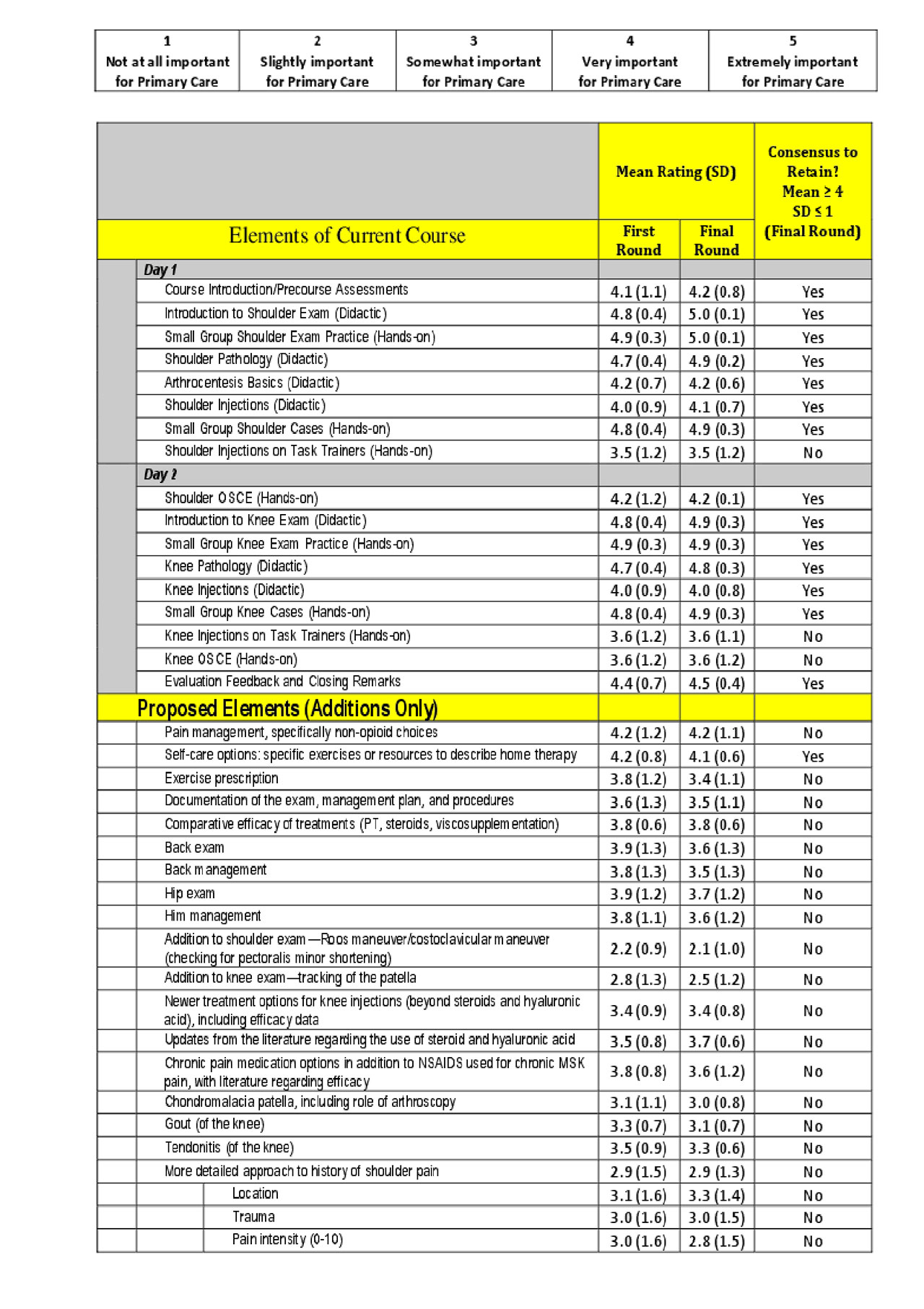Session Information
Date: Sunday, November 10, 2019
Title: Education Poster
Session Type: Poster Session (Sunday)
Session Time: 9:00AM-11:00AM
Background/Purpose: The Veterans Health Affairs (VHA) Simulation Learning, Education and Research Network (SimLEARN) National Simulation Center has developed a portfolio of continuing professional development (CPD) programs to strengthen the skills of primary care providers (PCPs) in the evaluation and management of common musculoskeletal (MSK) conditions. Instituted in 2015, these 2-day courses are held frequently at the SimLEARN Center in Lake Nona, FL, where they are taught by a rotating consortium of national faculty. The purpose of this study was to engage faculty in a systematic process of course evaluation using a structured consensus procedure inform ongoing curriculum development.
Methods: Eleven educators who had taught in the “MSK Clinician” (MSK-C) course at SimLEARN since 2015 were invited to participate in a 3-step Delphi process. Step 1 involved review of the current curriculum, with invitation to suggest additional content. In step 2, each educator rated every item’s importance in a curriculum for PCPs, using a 5-point Likert scale (1 = not at all important; 5 = extremely important). In the 3rd step, educators were given the groups’ average rating for each item, reminded of their own initial rating, and asked to make a final 5-point rating. Individual responses to each step remained anonymous. After the final step, items meeting the predetermined criteria of mean ³4 and standard deviation ≤1 were retained; these items defined group consensus.
Results: Eleven educators (100%; 8 physicians, 2 physician assistants, 1 nurse practitioner) completed all steps of the project.
In step 1, a total of 59 additional elements of the course were proposed by the group, though only one of these—the inclusion of teaching self-care options and specific elements of a home exercise program—met the criteria for consensus. In addition, three of the existing course elements—two sessions for practicing injections using task trainers, and the objective structured clinical examination of the knee—also were not endorsed by consensus.
Mean ratings of all current and proposed course elements in step 2 and step 3 of the consensus process are shown in the Table.
Conclusion: Using a systematic consensus exercise, the faculty of the SimLEARN MSK-C program have critically evaluated the current CPD course, as well as proposed additions to the existing curriculum. This information, combined with participant feedback, other measures of course effectiveness, and ongoing needs assessments conducted by VHA, will help inform the educational and administrative leadership of SimLEARN and give guidance to efforts for continued development of this important national resource.

MSK-C Curriculum Consensus Table
To cite this abstract in AMA style:
Battistone M, Anderson T, Brahaj A, Hearth-Holmes M, Hubbard L, Kim L, Miller P, O'Brien J, Siaton B, Wiltz S, Wong N, Durning S, Barker A. Use of a Systematic Consensus Process to Inform Development of the Veterans Health Affairs Simulation Learning, Education and Research Network (SimLEARN) Musculoskeletal Clinician Course [abstract]. Arthritis Rheumatol. 2019; 71 (suppl 10). https://acrabstracts.org/abstract/use-of-a-systematic-consensus-process-to-inform-development-of-the-veterans-health-affairs-simulation-learning-education-and-research-network-simlearn-musculoskeletal-clinician-course/. Accessed .« Back to 2019 ACR/ARP Annual Meeting
ACR Meeting Abstracts - https://acrabstracts.org/abstract/use-of-a-systematic-consensus-process-to-inform-development-of-the-veterans-health-affairs-simulation-learning-education-and-research-network-simlearn-musculoskeletal-clinician-course/
